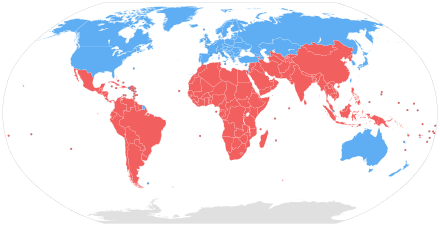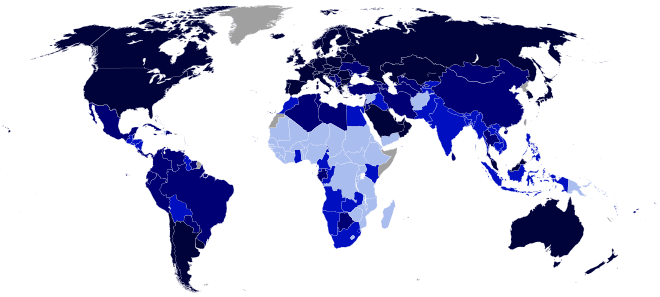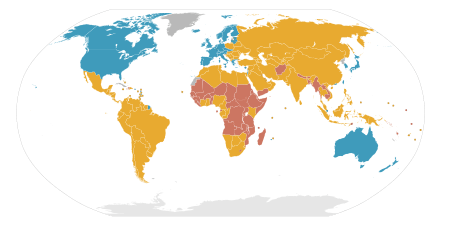Global South
The Global South is an emerging term, used by the World Bank and other organizations, identifying countries with one side of the underlying global North–South divide, the other side being the countries of the Global North.[2] As such the term does not inherently refer to a geographical south, for example most of the Global South is within the Northern Hemisphere.[2]


The term was first introduced as a more open and value free alternative to "third world"[3] and similar valuing terms.
Countries of the Global South have been described as newly industrialized or in the process of industrializing, are largely considered by freedom indices to have lower-quality democracies, and frequently have a history of colonialism by Northern, often European states. The countries Brazil, India, China, and Indonesia have the largest populations economies among Southern states. The overwhelming majority of these countries are located in or near the tropics and have at least one neglected tropical disease.
Origins
The first use of this Global South in a contemporary political sense was in 1969 by Carl Oglesby, writing in Catholic journal Commonweal in a special issue on the Vietnam War. Oglesby argued that centuries of northern "dominance over the global south […] [has] converged […] to produce an intolerable social order."[4]
The term gained appeal throughout the second half of the 20th century, which rapidly accelerated in the early 21st century. It appeared in fewer than two dozen publications in 2004, but in hundreds of publications by 2013.[5] The emergence of the new term meant looking at the troubled realities of its predecessors, i.e.: Third World or Developing World. The term is less hierarchical.[2] In a scholarly overview of the concept of the Global South, social psychiatrist Vincenzo Di Nicola offers a broader view of the historical associations and meanings of this term across a wide variety of domains of theory and practice, including culture (e.g., the négritude movement), history and politics (e.g., the Third World, the non-aligned movement), education (e.g., Paolo Freire's Pedagogy of the Oppressed), theology (e.g., Liberation theology, and mental health and psychiatry (e.g., Frantz Fanon).[6][7]
Debates over the term
With its development, many scholars preferred using the Global South over its predecessors, such as "developing countries" and "Third World". Leigh Anne Duck, co-editor of Global South, argued that the term is better suited at resisting "hegemonic forces that threaten the autonomy and development of these countries."[8] Alvaro Mendez, co-founder of the London School of Economics and Political Science's Global South Unit, have applauded the empowering aspects of the term. In an article, Discussion on Global South, Mendez discusses emerging economies in nations like China, India and Brazil. It is predicted that by 2030, 80% of the world's middle-class population will be living in developing countries.[9] The popularity of the term "marks a shift from a central focus on development and cultural difference" and recognizes the importance of geopolitical relations.[10]
Critics of this usage often argue that it is a vague blanket term".[11] Others have argued that the term, its usage, and its subsequent consequences mainly benefit those from the upper classes of countries within the Global South;[2] who stand "to profit from the political and economic reality [of] expanding south-south relations."[2]
Scope
The geographical boundaries of the Global South remain a source of debate. Critics and scholars like Andrea Hollington, Oliver Tappe, Tijo Salverda and Tobias Schwarz agree that the term is not a "static concept."[2] Others, like Rodolfo Magallanes, have argued against "grouping together a large variety of countries and regions into one category [because it] tends to obscure specific (historical) relationships between different countries and/or regions" and the power imbalances within these relationships.[2] He argues that this "may obscure wealth differences within countries – and, therefore, similarities between the wealthy in the Global South and Global North, as well as the dire situation the poor may face all around the world."[2]
The term is not strictly geographical, and is not "an image of the world divided by the equator, separating richer countries from their poorer counterparts."[2] Rather, geography should be more readily understood as economic and migratory, the world understood through the "wider context of globalization or global capitalism."[2]
Uses of the term
Global South "emerged in part to aid countries in the southern hemisphere to work in collaboration on political, economic, social, environmental, cultural, and technical issues."[12][13] This is called South–South cooperation (SSC), a "political and economical term that refers to the long-term goal of pursuing world economic changes that mutually benefit countries in the Global South and lead to greater solidarity among the disadvantaged in the world system."[12][13] The hope is that countries within the Global South will "assist each other in social, political, and economical development, radically altering the world system to reflect their interests and not just the interests of the Global North in the process."[12] It is guided by the principles of "respect for national sovereignty, national ownership, independence, equality, non-conditionality, non-interference in domestic affairs, and mutual benefit."[14][15] Countries using this model of South–South cooperation see it as a "mutually beneficial relationship that spreads knowledge, skills, expertise and resources to address their development challenges such as high population pressure, poverty, hunger, disease, environmental deterioration, conflict and natural disasters."[14][15] These countries also work together to deal with "cross border issues such as environmental protection, HIV/AIDS,"[14][15] and the movement of capital and labor.[14][15]
As Global South leaders became more assertive in world politics in the 1990s and 2000s, South-South cooperation has increased to "challenge the political and economic dominance of the North."[14][15][16] This cooperation has become a popular political and economic concept following geographical migrations of manufacturing and production activity from the North to the Global South[16] and the diplomatic action of several states, like China.[16] These contemporary economic trends have "enhanced the historical potential of economic growth and industrialization in the Global South," which has renewed targeted SSC efforts that "loosen the strictures imposed during the colonial era and transcend the boundaries of postwar political and economic geography."[12] Used in several books and American Literature special issue, the term Global South, recently became prominent for U.S. literature.[17]
Social psychiatrist Vincenzo Di Nicola has applied the Global South as a bridge between the critiques globalization and the gaps and limitations of the Global Mental Health Movement invoking Boaventura de Sousa Santos' notion of "epistemologies of the South" to create a new epistemology for social psychiatry.[6]
Government, politics and administration
Generally, states in the Global South have only attained full self-determination and democracy after the second half of the 20th century. Many were governed by an imperial European power until decolonization. Political systems in the Global South are diverse, but most states had established some form of democratic governments by the early 21st century, with varying degrees of success and political liberty.[18] Many are considered un-free or flawed democracies by freedom indices such as the Democracy Index, Freedom in the World and Index of Freedom in the World and Following decolonization and independence, elites have often had oligarchic control of the government.
The establishment of a healthy democratic state has often been challenged by widespread corruption and nepotism and a low confidence and participation in democratic process. The inhabitants of the Global South were introduced to democratic systems later and more abruptly than their Northern counterparts and were sometimes targeted by governmental and non-governmental efforts to encourage participation. 'Effective citizenship' is defined by sociologist Patrick Heller as: "closing [the] gap between formal legal rights in the civil and political arena, and the actual capability to meaningfully practice those rights".[19]
Beyond citizenship, the study of the politics of cross-border mobility in the Global South has also shed valuable light in migration debates, seen as a corrective to the traditional focus on the Global North.[20] Political scientists Fiona B. Adamson and Gerasimos Tsourapas identify a 'typology of nationalizing, developmental, and neoliberal migration management regimes' across the Global South.[21]
Economy
%2C_2018.jpg)
Developing countries loosely refers to the Global South. Following independence and decolonization in the 20th century, these states had dire need of new infrastructure, industry and economic stimulation. Many relied on foreign investment. This funding focused on improving infrastructure and industry, but led to a system of systemic exploitation. They exported raw materials, such as rubber, for a bargain. Companies based in the Western world have often used the cheaper labor in the Global South for production.[22] The West benefited significantly from this system, but left the Global South undeveloped.
This arrangement is sometimes called neocolonialism, meaning a system in which less-developed countries are taken advantage of by developed countries. It does not necessarily mean that former colonies are still controlled by their former colonizer; it refers to colonial-like exploitation. Third world countries are often helping further develop rich countries, rather than being developed themselves.[23] Several institutions have been established with the goal of putting an end to this system.[24] One of these institutions is the New International Economic Order. They have a 'no-strings-attached' policy that promotes developing countries remaining or becoming self-sufficient. More specifically, they advocate sovereignty over natural resources and industrialization.
The global issues most often discussed by nations from the Global South include globalisation, global health governance, health, and prevention needs. This is contrasted by issues Western nations tend to address, such as innovations in science and technology.[25] The comparison in healthcare between the Global North and Global south is substantially different.[26] Coalitions of developing nations, like the NIEO, frequently lobby for parity in the world stage. The rise of China might imply the rise of the BRIC countries.[22]
Associated theories
The term of the Global South has many researched theories associated with it. Since many of the countries that are considered to be a part of the Global South were first colonized by Global North countries, they are at a disadvantage to become as quickly developed. Dependency theorists suggest that information has a top-down approach and first goes to the Global North before countries in the Global South receive it. Although many of these countries rely on political or economic help, this also opens up opportunity for information to develop Western bias and create an academic dependency.[27] Meneleo Litonjua describes the reasoning behind distinctive problems of dependency theory as "the basic context of poverty and underdevelopment of Third World/Global South countries was not their traditionalism, but the dominance-dependence relationship between rich and poor, powerful and weak counties."[28]
What brought about much of the dependency, was the push to become modernized. After World War II, the U.S. made effort to assist developing countries financially in attempt to pull them out of poverty. Modernization theory "sought to remake the Global South in the image and likeliness of the First World/Global North."[28] In other terms, "societies can be fast-tracked to modernization by 'importing' Western technical capital, forms of organization, and science and technology to developing countries."[29] With this ideology, as long as countries follow in Western ways, they can develop quicker.
After modernization attempts took place, theorists started to question the effects through post-development perspectives. Post-Development theorists try to explain that not all developing countries need to be following Western ways but instead should create their own development plans. Felix Olatunji and Anthony Bature explain, “societies at the local level should be allowed to pursue their own development path as they perceive it without the influences of global capital and other modern choices, and thus a rejection of the entire paradigm from Eurocentric model and the advocation of new ways of thinking about the non-Western societies."[30] The goals of post-development was to reject development rather than reform by choosing to embrace non-Western ways.[31]
Media and the Global South
The Global South's often discussed struggle is to be equally represented in the media compared to the North. When looking at media coverage of developing countries, a generalized view has developed through Western media. Negative images and coverage of the poverty are frequent in the mass media when talking about third world countries. This common coverage has created a dominant stereotype of the Global South. Elisabeth Farny describes this as, "the 'South' is characterized by socioeconomic and political backwardness, measured against Western values and standards."[32] Mass media's role often compares the Global South to the North and is thought to be an aid in the divide.
Mass media has also played a role in what information the Global South receives. The news often covers developed countries and creates an imbalance of information flow.[33] The Global South does not often receive coverage of the other parts of the South but instead gets generous amounts of coverage on the North.
See also
| Look up Global South in Wiktionary, the free dictionary. |
| Wikimedia Commons has media related to Global South. |
References
- https://www.imf.org/external/datamapper/NGDPD@WEO/WEOWORLD/ADVEC
- "Introduction: Concepts of the Global South". gssc.uni-koeln.de. Archived from the original on 2016-09-04. Retrieved 2016-10-18.
- Mitlin, Diana; Satterthwaite, David (2013). Urban Poverty in the Global South: Scale and Nature. Routledge. p. 13. ISBN 9780415624664.
- Oglesby, Carl (1969). "Vietnamism has failed ... The revolution can only be mauled, not defeated". Commonweal. 90.
- Pagel, Heikie; Ranke, Karen; Hempel, Fabian; Köhler, Jonas (11 July 2014). "The Use of the Concept 'Global South' in Social Science & Humanities". Humboldt University of Berlin. Retrieved 2016-10-06.
- Di Nicola, Vincenzo (2020). "The Global South: An Emergent Epistemology for Social Psychiatry". World Social Psychiatry. 2(1): 20–26.
- Luiggi-Hernández, José G. (2020-04-03). "How the Global South Could Transform Mental Health". Mad In America. Retrieved 2020-04-04.
- "Introduction: Concepts of the Global South | GSSC". 2016-09-04. Archived from the original on 2016-09-04. Retrieved 2019-02-27.
- "Discussion on the Global South | GSSC". 2016-10-26. Archived from the original on 2016-10-26. Retrieved 2019-02-27.
- dados, nour; connell, raewyn (2012-01-01). "the global south". Contexts. 11 (1): 12–13. doi:10.1177/1536504212436479. JSTOR 41960738.
- Eriksen, Thomas Hylland (January 2015). "What´s wrong with the Global North and the Global South?". Global South Studies Center. Archived from the original on 2016-10-09. Retrieved 2016-10-06.
- Gray, Kevin; Gills, Barry K. (2016-04-02). "South–South cooperation and the rise of the Global South". Third World Quarterly. 37 (4): 557–574. doi:10.1080/01436597.2015.1128817. ISSN 0143-6597.
- South-south cooperation. (2013). Appropriate Technology, 40(1), 45-48. Retrieved from http://search.proquest.com/docview/1326792037
- United Nations. "United Nations: Special Unit for South-South Cooperation" (PDF). United Nations Development Programme. Archived from the original (PDF) on 2015-09-19.
- United Nations. "United Nations Office for South-South Cooperation". United Nations Development Programme. Archived from the original on 2012-12-03.
- Acharya, Amitav (2016-07-03). "Studying the Bandung conference from a Global IR perspective". Australian Journal of International Affairs. 70 (4): 342–357. doi:10.1080/10357718.2016.1168359. ISSN 1035-7718.
- Kim, Heidi Kathleen (Spring 2011). "The Foreigner in Yoknapatawpha: Rethinking Race in Faulkner's "Global South"". Philological Quarterly. 90: 199–228.
- Palat, Ravi Arvind (2010). "World Turned Upside Down? Rise of the global South and the contemporary global financial turbulence". Third World Quarterly. 31 (3): 365–366. doi:10.1080/01436597.2010.488465 – via JSTOR.
- Heller, Patrick (2012). "Democracy, Participatory Politics and Development: Some Comparative Lessons from Brazil, India and South Africa". Polity. 44 (4): 644–646. doi:10.1057/pol.2012.19 – via JSTOR.
- Haas, Hein de 1969- Verfasser. The age of migration : international population movements in the modern world. pp. 96–123. ISBN 978-1-352-00798-5. OCLC 1143614574.
- Adamson, Fiona B.; Tsourapas, Gerasimos (2019-10-24). "The Migration State in the Global South: Nationalizing, Developmental, and Neoliberal Models of Migration Management". International Migration Review. doi:10.1177/0197918319879057. ISSN 0197-9183.
- Roy, Pallavi (2016). "Economic growth, the UN and the Global South: an unfulfilled promise" (PDF). Third World Quarterly. 37 (7): 1291–1293. doi:10.1080/01436597.2016.1154440 – via JSTOR.
- Hickel, Jason (2017-01-14). "Aid in reverse: how poor countries develop rich countries | Jason Hickel". The Guardian. ISSN 0261-3077. Retrieved 2020-02-21.
- "Neocolonialism". Encyclopedia Britannica. Retrieved 2019-04-01.
- Ager, Alastair; Yu, Gary; Hermosilla, Sabrina (2012). "Mapping the key issues shaping the landscape of global public health". Global Public Health. 7 (1): 16–28. doi:10.1080/17441692.2012.679741. PMID 22765282.
- Alhaji, Mohammed; Alam (Sartaj). "Health Policy and System Research in Global South: Bridging the Gap through Citizen Participation". Journal of Postgraduate Medical Institute. 33 (1): 3–7. Check date values in:
|date=(help) - Ruvituso, Clara I (January 2020). "From the South to the North: The circulation of Latin American dependency theories in the Federal Republic of Germany". Current Sociology. 68 (1): 22–40. doi:10.1177/0011392119885170. ISSN 0011-3921.
- Litoniua, M.D. (2012). "Third World/Global South: From Modernization, to Dependent/Liberation, to Postdevelopment". Journal of the Third World Studies. 29 (1): 25–56.
- "Modernization Theory - an overview | ScienceDirect Topics". www.sciencedirect.com. Retrieved 2020-02-20.
- Olatunji, Felix O.; Bature, Anthony I. (September 2019). "The Inadequacy of Post-Development Theory to the Discourse of Development and Social Order in the Global South". Social Evolution & History. 18 (2). doi:10.30884/seh/2019.02.12.
- Matthews, Sally J. (2010-03-01). "Postdevelopment Theory". Oxford Research Encyclopedia of International Studies. doi:10.1093/acrefore/9780190846626.013.39. ISBN 9780190846626.
- "Dependency Theory: A Useful Tool for Analyzing Global Inequalities Today?". E-International Relations. Retrieved 2020-02-21.
- Philo, Greg (2001). "An unseen world: how the media portrays the poor". UNESCO Courier. 54 (11): 44.
Further reading
- Coexisting Contemporary Civilizations. Arabo-Muslim, Bharati Chinese, and Western by Guy Ankerl. INUPress, Geneva, 2000.
